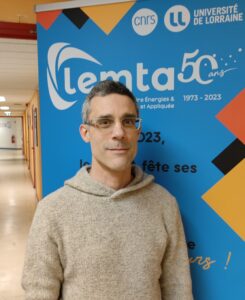Factuel went to meet Olivier Lottin, the new director of LEMTA since 1 January 2023.
What is your background?
After obtaining a PhD in mechanics and energy at Henri Poincaré University and at LEMTA in 1996, I was appointed lecturer at Polytech Nantes in 1998. I carried out my research at the Laboratoire de Thermique et Énergie de Nantes (LTEN). In the continuity of my thesis, I developed work on two-phase transfers and refrigerating machines, while taking charge of the option Cold-Conditioning of Polytech Nantes. In 2002, I returned to LEMTA on secondment to a CNRS research post. I made a complete thematic change by starting work on fuel cells and hydrogen. I was then appointed lecturer at the Faculty of Science and Technology in 2003, then professor at Polytech Nancy in 2008. I have been in charge of the Hydrogen and Electrochemical Systems team at LEMTA since its creation in 2006 until 2018, then of the Energy Vectors group until 2022.
What is your field of research?
Today, I mainly work on transfers coupled to electrochemical reactions in hydrogen fuel cells of the PEMFC (ionomer membrane fuel cells) type. These are essentially experimental approaches, where we are trying to understand the limits of performance at the cell level, the origin of operating heterogeneities and, above all, the problems of ageing. The interest of this research work lies in its multidisciplinary nature: it takes on its full meaning within the framework of partnership projects with teams from other laboratories, which will provide us with their skills in materials science, for example, while we take charge of data acquisition and interpretation on the scale of instrumented cells designed and manufactured in the laboratory. The results of our work can also have very important impacts on the performance and durability of fuel cells or systems produced by industrial partners.
Can you say a few words about LEMTA?
LEMTA is a joint research unit of the University of Lorraine and the CNRS. It is one of the oldest laboratories of the University, associated with the CNRS since 1976 and created in 1973: this year we are celebrating our fiftieth anniversary!
If we are initially known and recognized in the fields of energy and mechanics, the LEMTA of 2023 has been able to evolve towards a greater multidisciplinarity, with competences in electrical engineering, electrochemistry, or even nano-physics, which have come to complete our historical know-how base. Today, the LEMTA is characterised by its ability to develop cutting-edge experimental techniques, in the fields of laser metrology for example, thermal characterisation, NMR methodologies, or even the instrumentation of electrochemical cells. Finally, the laboratory is also distinguished by a strong policy of mutualisation, which affects all of its research support services: the technical services (mechanics, electronics, IT and logistics) as well as the administrative and financial centre with, in addition to transverse projects, the pooling of 15 to 20% of our resources, excluding salaries. This is clearly an asset for the day-to-day management of the laboratory and for its long-term scientific policy, as well as for the reception of our young lecturers and research fellows.
What are your projects within the laboratory?
My ambition is first of all to ensure continuity in the management of the laboratory and to consolidate our strengths. Beyond that, it will have escaped no one’s notice that all energy-related themes are attracting considerable socio-economic interest: the main challenge for LEMTA is undoubtedly to manage a growth phase that will probably continue for several years, with all that this implies in terms of opportunities, but also constraints. If we are already identified and recognised in the field of energy and energy transition, in the Region and beyond, at the national and international, industrial and academic levels, we must nevertheless continue in the direction of scientific excellence: we must not forget our fundamental skills and know-how, which are very present, but which are sometimes overshadowed by communication and requests that are very much focused on applications. At the local level, LEMTA will continue to provide strong support to the Carnot Institute Icéel and will strengthen its policy of collaboration within the EMPP scientific cluster, and the University of Lorraine in general.
Another challenge awaits the laboratory’s management: the integration of quality criteria (in the broadest sense) of which university research and all professions are gradually becoming aware. First of all, the quality of life at work, with the regular evaluation of psycho-social risks and the inclusion of parity and inclusion indicators, for example. Next, the environmental impact of our research activities will also have to be assessed, and of course limited as much as possible, in line with the sustainable development and societal policies of the University of Lorraine and the CNRS. Finally, we must also talk about the quality of our research work, with a concern for opening up our results and our data: in this respect, the LEMTA has undertaken a process of Infra+ (Lorraine University of Excellence) labelling for the majority of its experimental platforms. This action could, in the long term, lead to an ISO 9001 qualification for some of our equipment.
Finally, I cannot finish without a word for the laboratory staff: doctoral students, post-doctoral fellows, administrative and technical staff, researchers and teacher-researchers. All of them participate in the life of the laboratory with an exemplary degree of involvement that delights me every day, and I thank them for it. In return, their expectations of the institutions that govern us are high. It is important that they are not disappointed so that this dynamic is maintained as long as necessary and that the LEMTA can fully play its role and face the colossal challenges of the 21st century.
